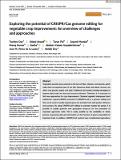Por favor, use este identificador para citar o enlazar a este item:
http://hdl.handle.net/10261/296057COMPARTIR / EXPORTAR:
 SHARE SHARE
 CORE
BASE CORE
BASE
|
|
| Visualizar otros formatos: MARC | Dublin Core | RDF | ORE | MODS | METS | DIDL | DATACITE | |

| Título: | Exploring the potential of CRISPR/Cas genome editing for vegetable crop improvement: An overview of challenges and approaches |
Autor: | Das, Tuyelee; Anand, Uttpal; Pal, Tarun; Mandal, Sayanti; Kumar, Manoj; Radha; Gopalakrishnan, Abilash Valsala; Pérez de Lastra, José Manuel CSIC ORCID ; Dey, Abhijit | Palabras clave: | CRISPR/Cas9 gene knockout regulatory framework stress tolerance |
Fecha de publicación: | 5-feb-2023 | Editor: | John Wiley & Sons | Citación: | Biotechnology and bioengineering, 12(9), 2179: 1-14 (2022) | Resumen: | Vegetables provide many nutrients in the form of fiber, vitamins, and minerals, which make them an important part of our diet. Numerous biotic and abiotic stresses can affect crop growth, quality, and yield. Traditional and modern breeding strategies to improve plant traits are slow and resource intensive. Therefore, it is necessary to find new approaches for crop improvement. Clustered regularly interspaced short palindromic repeats/CRISPR associated 9 (CRISPR/Cas9) is a genome editing tool that can be used to modify targeted genes for desirable traits with greater efficiency and accuracy. By using CRISPR/Cas9 editing to precisely mutate key genes, it is possible to rapidly generate new germplasm resources for the promotion of important agronomic traits. This is made possible by the availability of whole genome sequencing data and information on the function of genes responsible for important traits. In addition, CRISPR/Cas9 systems have revolutionized agriculture, making genome editing more versatile. Currently, genome editing of vegetable crops is limited to a few vegetable varieties (tomato, sweet potato, potato, carrot, squash, eggplant, etc.) due to lack of regeneration protocols and sufficient genome sequencing data. In this article, we summarize recent studies on the application of CRISPR/Cas9 in improving vegetable trait development and the potential for future improvement. | Versión del editor: | https://doi.org/10.1002/bit.28344 | URI: | http://hdl.handle.net/10261/296057 | DOI: | 10.1002/bit.28344 | ISSN: | 0006-3592 | E-ISSN: | 1097-0290 |
| Aparece en las colecciones: | (IPNA) Artículos |
Ficheros en este ítem:
| Fichero | Descripción | Tamaño | Formato | |
|---|---|---|---|---|
| Exploring-Das_et_al-2023-Biotech_Bioengineering.pdf | Artículo principal | 1,33 MB | Adobe PDF |  Visualizar/Abrir |
CORE Recommender
SCOPUSTM
Citations
8
checked on 04-may-2024
WEB OF SCIENCETM
Citations
5
checked on 26-feb-2024
Page view(s)
48
checked on 09-may-2024
Download(s)
388
checked on 09-may-2024
Google ScholarTM
Check
Altmetric
Altmetric
Este item está licenciado bajo una Licencia Creative Commons

